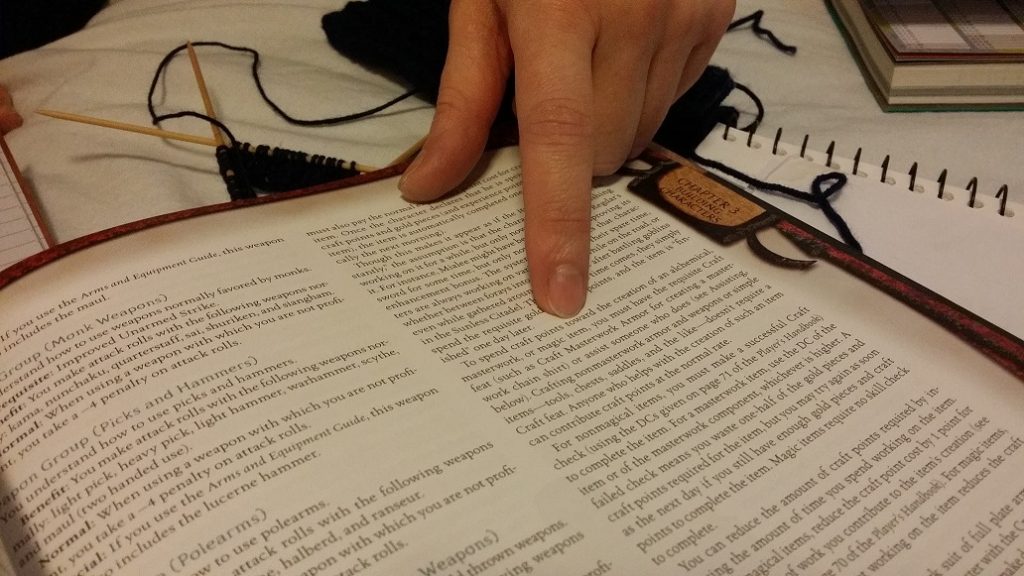In his paper “Rules Lawyering as Symbolic and Linguistic Capital” (Analog Game Studies, Vol. 4, issue V), Steven Dashiell discusses the phenomenon of rules lawyering in tabletop role-playing games viewed through the lens of Pierre Bourdieu’s theory of capital.
Rules lawyering is the practice of arguing the details and interpretations of the game rules during the game, usually in a way that slows the game down and refocuses it from the act of playing to the debate of rules. Dashiell cites Gary Alan Fine’s definition from Shared Fantasy, “a participant in a rules-based environment who attempts to use the letter of the law without reference to the spirit, usually in order to gain an advantage within that environment“, and offers his own, “a player who explicitly and fervently offers a different interpretation of the rules than the Game Master during gameplay”.
The term is as old as the hobby, and is regarded as a negative. Dashiell draws the connection from the rules lawyer’s masculine modes of discourse, such as argument, to the broader hegemonic masculinity of the field of tabletop role-playing games. Indeed, Dashiell’s definition of the phrase foregrounds the element of conflict with the Game Master and the rules lawyer’s taking of the spotlight, which become social currency.
To briefly summarize Bourdieu’s theory of capital, it is a way of conceptualizing the individual’s (actor) relationship with the social world. By looking at the practices an actor engages in, especially habitual ones, a sense may be gained of what things the actor and the system value. Initially, Bourdieu discussed social, cultural, and economic capital, but later expanded the classification to include other types such as symbolic and linguistic capital. It is these last two that Dashiell focuses on.
Symbolic capital, according to Dashiell, involves having “a specific item of value” – in this case, encyclopaedic knowledge of the rules of the game – and “being able to appreciate it and convey its value” – by quoting the rules from memory, and challenging the Game Master’s, who holds nominal authority at the game table, interpretation of the rules.
Linguistic capital, in turn, is about understanding languages and modes of discourse and being able to harness those modes in the appropriate contexts. The practice of rules lawyering relies on linguistic capital in its requirement for precise expression – the words in the rules have very specific meanings and using the wrong terms makes one look like they do not know what they are talking about.
The rules lawyer’s method of discourse is characterized by interruption, to the degree that Dashiell invokes Johan Huizinga’s concept of spoilsport. It breaks the other players’ immersion in the game, and while masculine modes of discourse such as interruption and argument are theorized to strengthen male homosocial relationships, it does harm everyone else’s enjoyment of the game. This arguably also weakens the rules lawyer’s social capital.
Finally, Dashiell notes that the rules lawyer’s modes of discourse are those of the hegemony, which in the context of tabletop role-playing games usually translates as white and male. It is a dominant form of speech that can be seen as excluding minorities, and strengthening masculine power, whose preserve is shrinking in these days of more diverse gaming tables and increasingly vocal conversations about concerns such as racism and sexism.
Original article: http://analoggamestudies.org/2017/11/rules-lawyering-as-symbolic-and-linguistic-capital/
You might also like
More from Game Research Highlights
How do you want to do this? – A look into the therapeutic uses of role-playing games
Can playing RPGs contribute positively to your wellbeing? A recent study aims to find out how RPGs are being used …
Eldritch horrors and tentacles – Defining what “Lovecraftian” is in games
H.P. Lovecrafts legacy lives today in the shared world of Cthulhu Mythos and its iconic monsters. Prema Arasu defines the …
Are Souls Games the Contemporary Myths?
Dom Ford’s Approaching FromSoftware’s Souls Games as Myth reveals the Souls series as a modern mythology where gods fall, desires …

















Leave A Reply
[…] “Dungeons & Dragons & Deleuze”, based on a paper by Curtis Carbonell; and “The Hegemonic Masculinity of Rules Lawyering”, based on a paper by Steven […]